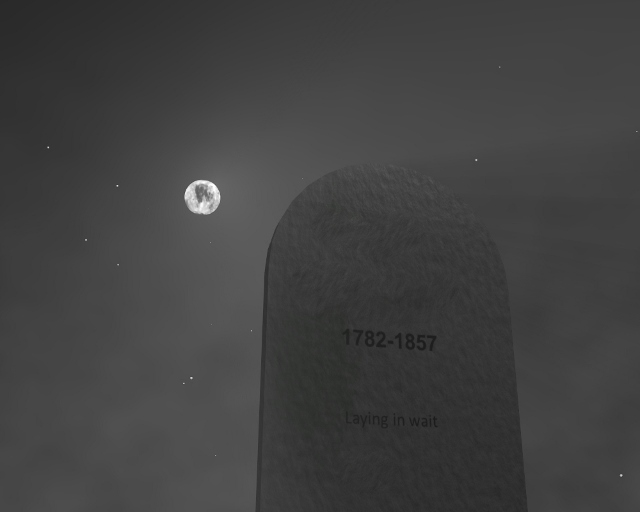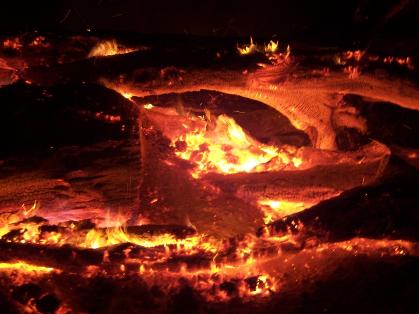Characteristics of Death

One of the most misunderstood subjects today is the subject of death. Everyone at some point in their life, thinks about this subject and asks themselves the question - "What will happen to me when I die?"
In order to understand this subject, we should look back in history and see where "Death" first came into the picture.
Notice that in Genesis chapter 1, mankind is created by God -
Gen 1:27-31 "So God created man in his own image, in the image of God created he him; male and female created he them...And God saw every thing that he had made, and, behold, it was very good. And the evening and the morning were the sixth day."
Also notice that this is before death & sin comes into the picture, because it states that "everything that he had made" was "very good!"
Now the Bible even gives the description of "how" God created man.
Gen 2:7 "And the LORD God formed man of the dust of the ground, and breathed into his nostrils the breath of life; and man became a living soul."
In this verse, we see what basically amounts to a mathematical equation in the making of mankind.
Dust + Breath = A Living Soul
So for mankind to come into existence, there has to be a combination of the "Dust" of the ground and the "Breath" of life - and these two components when combined equals "A Living Soul".
But God gave man a warning.
Gen 2:17 "But of the tree of the knowledge of good and evil, thou shalt not eat of it: for in the day that thou eatest thereof thou shalt surely die."
So what we have here is two different mathematical equations.
Life is... Dust (Body) + Breath (Spirit) = A Living Soul
and the reversal of that equation
Death is... Dust (Body) - Breath (Spirit) = A Dead Soul/No Soul
Now this is an extremely important equation to understand for several reasons.
For one, there is a teaching that is gaining momentum today, that a person's soul continues to live on after their body dies. But as you can see from this equation, death results in the "soul" ceasing to exist.
In simple terms, the "soul" is the "life" - which, at death, ceases to exist!
There are other problems with this doctrine of an "immortal soul" as well. The Bible states that God is the only one who naturally has immortality.
1Timothy 6:16 "Who only hath immortality, dwelling in the light which no man can approach unto; whom no man hath seen, nor can see: to whom be honour and power everlasting. Amen."
If the Creator is the only one who has immortality, then how do humans get immortal? The answer is simple, it is a gift that is given by God to His people (those who accept His gift). But does mankind have that gift now? No! The Bible is clear that that gift is given to the righteous - at the resurrection.
1Cor. 15:51-54 "Behold, I shew you a mystery; We shall not all sleep, but we shall all be changed, In a moment, in the twinkling of an eye, at the last trump: for the trumpet shall sound, and the dead shall be raised incorruptible, and we shall be changed. For this corruptible must put on incorruption, and this mortal must put on immortality. So when this corruptible shall have put on incorruption, and this mortal shall have put on immortality, then shall be brought to pass the saying that is written, Death is swallowed up in victory."
We also see this same concept in Romans 6:23 "For the wages of sin is death; but the gift of God is eternal life through Jesus Christ our Lord."
Notice that the wages (penalty) for sin is "death" - but God promises to give the gift of immortality to those who accept Jesus Christ.
Ezekiel 18:20 "The soul that sinneth, it shall die..."
Romans 5:12 "Wherefore, as by one man sin entered into the world, and death by sin; and so death passed upon all men, for that all have sinned:
The Bible is very clear, that the soul can die and that there is no such thing as the "natural immortality of the soul" - that doctrine is a repeat of Satan's first lie! It is merely an attempt to do what Satan has always tempted man to do - to try to become "like God"!
Well, notice that this last verse gives us a clue - it refers to "sleep." We also see that Christ Himself referred to "death" as "sleep".
John 11:11-14 "These things said he: and after that he saith unto them, Our friend Lazarus sleepeth; but I go, that I may awake him out of sleep. Then said his disciples, Lord, if he sleep, he shall do well. Howbeit Jesus spake of his death: but they thought that he had spoken of taking of rest in sleep. Then said Jesus unto them plainly, Lazarus is dead."
When you go to bed at night, you close your eyes, and suddenly the alarm clock goes off. You have just passed through many hours of sleep, yet you were not aware of any passage of time. This is what death is like.
When you die, you close your eyes and the next thing you are aware of is the sound of the trumpet and the Creator's voice calling the dead in Christ to "wake up." Several thousand years may have passed on planet earth since you died, but to you it is only a moment!


But what does the Bible teach about this doctrine?
Someone may say, "In Revelation it says that they will burn forever."
This is the text that they are referring to:
Rev. 20:10 "And the devil that deceived them was cast into the lake of fire and brimstone, where the beast and the false prophet are, and shall be tormented day and night for ever and ever."
But it is important to understand that the concept of "forever" does not necessarily mean what we think it does.
Notice that the Bible uses the term "forever" in other ways.
Exodus 21:6 "Then his master shall bring him unto the judges; he shall also bring him to the door, or unto the door post; and his master shall bore his ear through with an aul; and he shall serve him for ever."
1Sam. 1:22 "But Hannah went not up; for she said unto her husband, I will not go up until the child be weaned, and then I will bring him, that he may appear before the LORD, and there abide for ever."
Jonah 2:6 "I went down to the bottoms of the mountains; the earth with her bars was about me for ever: yet hast thou brought up my life from corruption, O LORD my God."
Obviously, the term "forever" doesn't mean that the servant is still serving that master, or that Samuel is still in the temple of the Lord, or that Jonah is still in the belly of the fish.
The term "forever" simply means as long as the person shall live, or until there is a change in the circumstances.
This is also the case with the fires of hell. The wicked who are destroyed in the fire will only be "tormented" until they are totally consumed.
Mal. 4:1-3 "For, behold, the day cometh, that shall burn as an oven; and all the proud, yea, and all that do wickedly, shall be stubble: and the day that cometh shall burn them up, saith the LORD of hosts, that it shall leave them neither root nor branch...And ye shall tread down the wicked; for they shall be ashes under the soles of your feet in the day that I shall do this, saith the LORD of hosts."
Psalm 37:10 "For yet a little while, and the wicked shall not be: yea, thou shalt diligently consider his place, and it shall not be."
Psalm 37:20 "But the wicked shall perish, and the enemies of the LORD shall be as the fat of lambs: they shall consume; into smoke shall they consume away."
Rev 20:9 And they went up on the breadth of the earth, and compassed the camp of the saints about, and the beloved city: and fire came down from God out of heaven, and devoured them.
Even Satan and his angels will be totally burned up!
Ezekiel 28:18 "Thou hast defiled thy sanctuaries by the multitude of thine iniquities, by the iniquity of thy traffick; therefore will I bring forth a fire from the midst of thee, it shall devour thee, and I will bring thee to ashes upon the earth in the sight of all them that behold thee."
You see, the wicked do not get the "gift of eternal life" to spend in the fire - they are turned to ashes - and then the fire goes out!
You can also see, by these last two verses, that the fires of hell are "on" this earth - which reveals that hell is not burning now, but is a future event (as shown by Rev. 20:7).
Here is another verse that causes some people difficulty.
Mark 9:43 "And if thy hand offend thee, cut it off: it is better for thee to enter into life maimed, than having two hands to go into hell, into the fire that never shall be quenched:"
These references are often used to try to prove that the fires of hell never go out. But that is not what the verse says. It says that the fire can not be quenched. That means that nothing can put out the fire. But that doesn't mean that the fire won't go out on its own accord - which is the natural result when all its "fuel" is burned up!
Here is a prophecy about the destruction of Jerusalem.
Jer. 17:27 "But if ye will not hearken unto me to hallow the sabbath day, and not to bear a burden, even entering in at the gates of Jerusalem on the sabbath day; then will I kindle a fire in the gates thereof, and it shall devour the palaces of Jerusalem, and it shall not be quenched."
It says that Jerusalem was to be destroyed by fire that would not be quenched. Is Jerusalem still burning today? Of course not! But if you read the historical accounts of it's destruction, even the Roman soldiers could not put out the fire - but it went out on it's own, once everything that was burnable was burned up!
For fire to be "unquenchable" it only has to keep burning whenever someone tries to put it out. But once the fuel is all burned up and ashes are all that is left, the fire will simply go out on its own accord - yet it was never quenched!
It is the same thing with this text.
Jude 1:7 "Even as Sodom and Gomorrha, and the cities about them in like manner, giving themselves over to fornication, and going after strange flesh, are set forth for an example, suffering the vengeance of eternal fire."
So Sodom and Gomorrha were destroyed with "eternal fire!" But yet, they are not still burning today. In fact, several archeologists believe they have found the sites of these ancient cities at the south end of the Dead Sea. The area is covered in ash and sulfer (brimstone).
2Peter 2:6 "And turning the cities of Sodom and Gomorrha into ashes condemned them with an overthrow, making them an ensample unto those that after should live ungodly;"